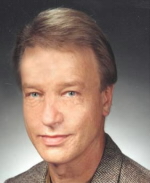
Gary L. Wells (Ph.D. from Ohio State University, 1977) is Professor of Psychology at Iowa State University and holds the title of Distinguished Professor. Professor Wells is also the Social Science Research Director of the American Judicature Society's Institute of Forensic Science and Public Policy in Greensboro , North Carolina. He is an internationally recognized scholar in scientific psychology and his studies of eyewitness memory are widely known and cited. Wells has authored over 150 articles and chapters and two books. Most of this work has been focused on the reliability of eyewitness identification. His research on eyewitness identification is funded by the National Science Foundation and his findings have been incorporated into standard textbooks in psychology and law.
His studies demonstrate that rates of mistaken eyewitness identification can be exacerbated by the methods that crime investigators use in conducting lineups and photo spreads. Professor Well's eyewitness research program was launched in 1974 and is directed at discovering the causes of mistaken identification from police lineups and photo spreads; with a particular emphasis on how to prevent these errors. Numerous successful interventions have been developed, such as:
Over 30 years of groundbreaking research has produced a large number of theoretical and applied real world advances. These include developing a better understanding of the tenuous link between confidence and accuracy in eyewitness identification, describing the origins of false confidence, defining the domain of variables that control accuracy, and proposing and developing new lineup procedures. In relation to developing new lineup procedures, two major advancements are the The Sequential Lineup (put simply witnesses view suspects one at a time rather than simultaneously); and Double-Blind Techniques whereby the person responsible for the lineup does not know who the real suspect is.
Professor Wells has served as an expert for the defense, prosecution, and plaintiffs in criminal and civil cases across the U.S. and Canada. His conclusions about eyewitness identification have received national media attention in such places as the New Yorker magazine, Time magazine, the Chicago Tribune, the Los Angeles Times, and the New York Times. He has made appearances on CBS’s 48 Hours, the NBC Nightly News, CNN’s Newsnight, and NBC’s Today Show, among others. He has given more than 100 workshops and presentations to trial judges, prosecutors, defense attorneys, and police across the U.S. and Canada in the last five years.
He was a founding member of the U.S. Department of Justice group that developed the first set of national guidelines for eyewitness evidence. He co-chaired the panel that wrote the Justice Department training manual for law enforcement on the collection and preservation of eyewitness identification evidence, which has been distributed to every law enforcement agency in the U.S. Wells has worked with prosecutors and police in New Jersey, North Carolina, Maryland, Massachusetts, California, Washington, Wisconsin, Minnesota, Illinois, Colorado, Iowa, New York, and other states to reform the way they conduct police lineups. In 2001 Wells was given the Distinguished Contributions to Psychology and Law Award from the American Psychology-Law Society. In 2004, Wells was elected President of the American Psychology-Law Society.
To find out more about Professor Wells and how to access his comprehensive collection of quality eyewitness memory related reference material visit the main forensic psychology website.
http://www.all-about-forensic-psychology.com/eyewitness.html

No comments:
Post a Comment